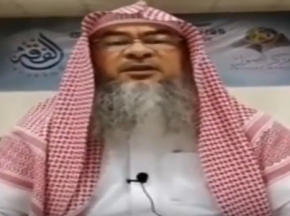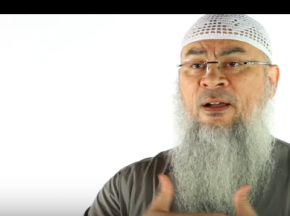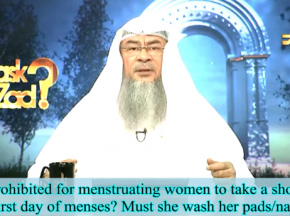content of level
Types of Hajj
Types of Hajj
Learn Fiqh with Al-Hakeem | Ghusl, or taking a bath - Tayammum, or dry ablution
In this Lecture, Sh. Assim Al-Hakeem explains the rules of Ghusl, or taking a bath and illustrates the Tayammum, or dry ablution and how it done. This course will cover all the practical rules that every Muslim, man or woman, should know, citing their bases in the Qur’an and the Sunnah.
Learn Fiqh with Al-Hakeem | What does not invalidate ablution
In this Lecture, Sh. Assim Al-Hakeem explains what does not invalidate ablution; such as any discharge from private parts and this applies to stool, urine, semen, blood and wind. Also Deep sleep and touching one’s private parts break ablution.
Learn Fiqh with Al-Hakeem | The ablution
In this Lecture, Sh. Assim Al-Hakeem explains the rules and requirements of Ablution, i.e. Wudu. He also illustrates the actions are recommended when performing the ablution.
Learn Fiqh with Al-Hakeem | The purification - Part 2
In this Lecture, Sh. Assim Al-Hakeem explains the meaning of Purification and illustrates several important aspects of Tahara (purity and cleanliness) in Islam. This course will cover all the practical rules that every Muslim, man or woman, should know, citing their bases in the Qur’an and the Sunnah.
Learn Fiqh with Al-Hakeem | The Purification
In this Lecture, Sh. Assim Al-Hakeem explains the rules of Purification and illustrates the etiquette that must be followed when using the toilet. This course will cover all the practical rules that every Muslim, man or woman, should know, citing their bases in the Qur’an and the Sunnah.
Learn Fiqh with Al-Hakeem | The Leading Fiqh Scholars
In this Lecture, Sh. Assim Al-Hakeem discusses and explains the Leading Fiqh Scholars (Founders of the four schools of Fiqh), such as Abu Hanifah, Malik, Al-Shafi'iand Ahmad ibn Hanbal.
Learn Fiqh with Al-Hakeem | The Islamic law
In this Lecture, Sh. Assim Al-Hakeem discusses and explains the meaning of Islamic Law (Fiqh), Linguistically speaking, the Arabic term ‘Fiqh’ has several meanings, including ‘understanding’ and ‘profound and accurate understanding’. In an Islamic context, it means ‘knowledge of Islamic rulings on practical matters based on detailed evidence.
Learn Fiqh with Al-Hakeem | An introduction to Islamic Fiqh
In this Lecture, Sh. Assim Al-Hakeem discusses and explains a brief introduction to the meaning of Islamic jurisprudence (fiqh). This course will cover all the practical rules that every Muslim, man or woman, should know, citing their bases in the Qur’an and the Sunnah.
The Prophet's Prayer from Authentic Ahadith
The Prophet's Prayer from Authentic Ahadith.
How can I Regain My Faith?
How can I Regain My Faith? Dr. Mohammed Salah.
Custody of the children in case of divorce?
Custody of the children in case of divorce? - Assim Al-Hakeem
Ruling on vinegar made from wine
Ruling on vinegar made from wine.
Paying Annual zakat for a family member
Paying Annual zakat for a family member.
Pronouncing the Intention for the Prayer
Pronouncing the Intention for the Prayer.
Is it prohibited for women to take shower during first days of menses?
Is it prohibited for women to take shower during first days of menses?- Assim Al-Hakeem.
Qunoot during Calamities (Qunoot Nazilah)
Qunoot during Calamities (Qunoot Nazilah) - Assim al hakeem.
Who can give away a chaste Christian lady to Muslim Man in marriage if she has no family?
Who can give away a chaste Christian lady to Muslim Man in marriage if she has no family?- Assim Al-Hakeem
How to tell close relatives we cannot attend their mixed wedding without serving kinship?
How to tell close relatives we cannot attend their mixed wedding without serving kinship?- Assim Al-Hakeem.
If I did not say Bismillah before making Wudu, does it make the Wudu invalid?
If I did not say Bismillah before making Wudu, does it make the Wudu invalid? - Assim al hakeem.




















